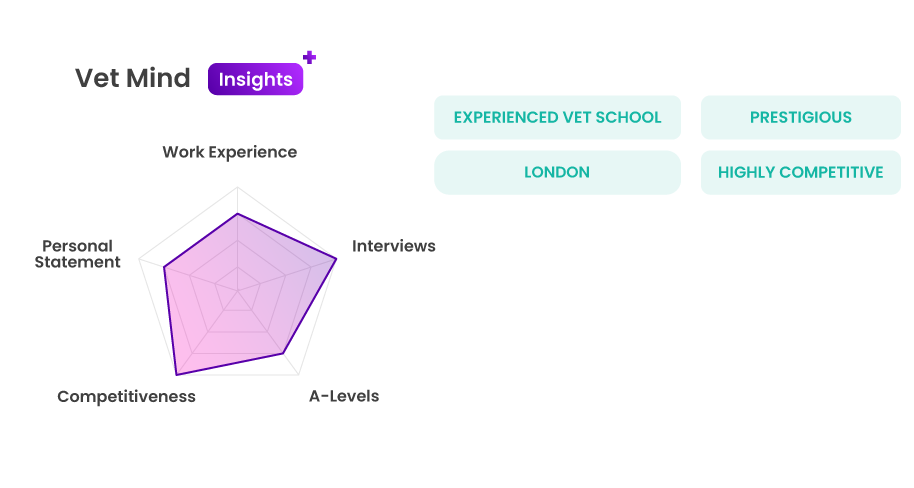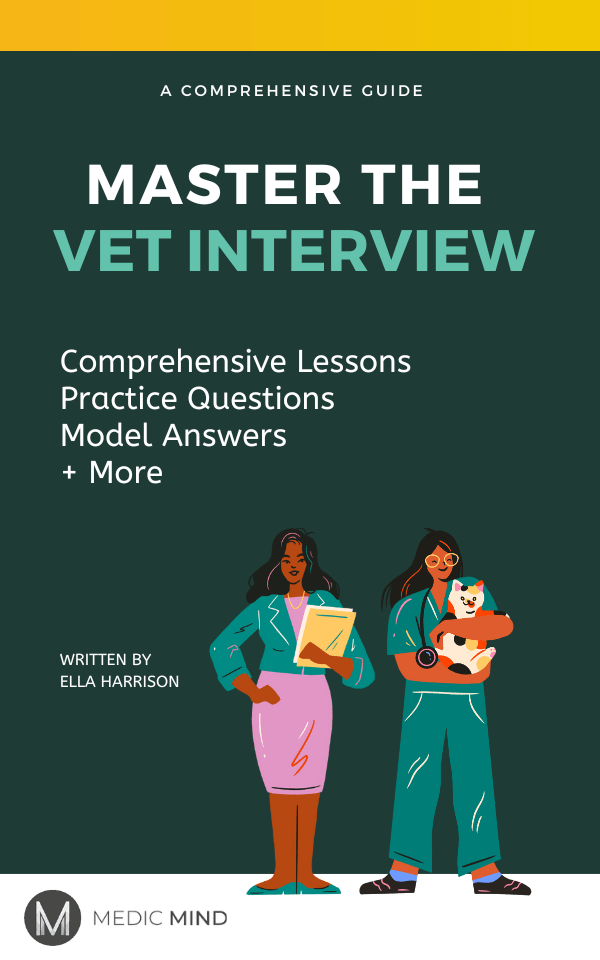Royal Veterinary College London

Overview
At arguably the most prestigious veterinary school in the UK, the Bachelor of Veterinary Medicine programme offered by RVC offers world-leading scientific and clinical training in veterinary medicine. RVC is located in the heart of London (Camden) and offers a vast range of veterinary programmes (from veterinary nursing to postgraduate veterinary degrees. Their Veterinary Medicine and Surgery degree, however, is a course built upon their extensive veterinary history, and takes a fresh approach in bringing together technological change, clinical and scientific progress, and stimulating teaching and learning methods.
Key Points
- London
- Global accreditation
- Prestigious
Insider’s Guide to RVC School from Bronte Griffin, RVC Student
What makes RVC unique to other veterinary schools?
What really stood out to me about the RVC when I was applying for vet med was how passionate RVC students are about the university. Now as an RVC student myself I completely understand this love for the university. It is an incredible university to be a student at because all of the students are so friendly. Some people think that being at a university of just vet students would be boring but this couldn’t be further from the truth. We are all linked by our shared goal of being vets and this creates an incredible community to be a part of. Something else that makes the RVC really stand out is that it is accredited in the UK, the EU and the USA and Canada. This gives students the option to work in these countries much more easily when they qualify which will open endless opportunities to travel and gain experience abroad.

Course Structure at RVC School
The RVC uses a spiral curriculum which means that topics you cover in first year will come up in subsequent years where they will be developed on and become increasingly more complex in different contexts. The first 2 years are preclinical so here you learn about the healthy animal so that in years 3-5 you can learn about what is abnormal.
Year 1 at RVC School
In first year you learn about the main body systems such as the locomotor strand (which is learning about how the animal moves, the limbs etc.) and the alimentary strand (which is all about the digestive system). This is where you learn about the basic principles that can then be developed with clinical knowledge later in the course. There are weekly practicals to help with learning anatomy.
Year 2 at RVC School
Second year is the last pre-clinical year so in this year you will revisit many of the strands from last year to add detail and complexity to these principles. There are more practicals and dissections too to help learn the anatomy of the normal, healthy animal.
Year 3 at RVC School
Third year is the first clinical year so this is where you will begin to learn about diseases and how these can be treated
Year 4 at RVC School
Fourth year contains some teaching and also clinical rotations which is where you will spend time out in clinics observing consultations and surgeries to put all of your learning into practice and expand upon it.
Year 5 at RVC School
Fifth year you also spend doing your clinical rotations.
Teaching Style at RVC School
What is the general teaching style at RVC? E.g. is it PBL/Traditional? etc.
The RVC has lots of group work so we complete a directed learning every week which is where you work through a task with your tutor group. This may be a clinical case or something similar where you use the lectures from the week to put that knowledge into practice and use the information to problem solve. These sessions are really helpful in making content make sense and helping you to remember what you have been taught. We also have weekly practicals to help us learn anatomy which is really helpful as things look very different in the real animal to in pictures online!
Does RVC offer dissection?
The RVC does have a lot of dissection which is really helpful for starting to learn how to properly hold and use surgical instruments before we even get to the clinical years. It is also really helpful in learning the anatomy of the animals.
Does RVC offer a BSc? If so, how is the BSc year?
Intercalation is an option at the RVC. Normally this is done between 2nd and 3rd year. You can either do this at a different university or the RVC do offer two courses which you can intercalate in: Bioveterinary Sciences and Comparative Pathology. This is a great way to learn new skills, gain additional scientific knowledge, gives you the opportunity to undertake a research project and allows you to explore a subject that you are really interested in.
What is the pre-clinical / clinical split like? Do you get early clinical exposure?
The first 2 years are preclinical and the last 3 are clinical. Within your first years, you are expected to complete 12 weeks of AHEMS placements outside of term time. This is where you spend time enhancing your animal handling skills, for example by spending time lambing, on a dairy farm, at a stables or at a kennels. These placements allow you to gain invaluable experience and knowledge from the placement providers whilst also learning how to handle these animals and gain confidence with them.
Social Life at RVC School
What are the clubs and societies like? What is the social life like?
There is a huge variety of clubs and societies available at the RVC from things such as the Farm Animal society to sports clubs and music clubs. There really is something for everyone and if there isn’t you can set up your own society! The RVC is also part of the university of London meaning you have access to all of their clubs and societies too.
FAQs
The Royal Veterinary College London (RVC) is a leading veterinary school in the United Kingdom. It offers a wide range of undergraduate and postgraduate programs in veterinary medicine, veterinary nursing, and biosciences.
The Royal Veterinary College London offers a variety of undergraduate and postgraduate programs, including Bachelor of Veterinary Medicine, Bachelor of Veterinary Nursing, Master of Research, and Doctor of Veterinary Medicine. The college also offers postgraduate research degrees in various areas of veterinary and biosciences.
The admission process at the Royal Veterinary College London is highly competitive, with a limited number of spaces available in each program. Admission is based on a combination of academic achievement, work experience, and personal statement. Applicants are also required to pass an interview process.
The requirements for admission to the Royal Veterinary College London vary depending on the program. Generally, applicants are required to have a strong academic background in science or a related field, relevant work experience, and a compelling personal statement.
Graduates of the Royal Veterinary College London are well-prepared for careers in veterinary medicine, research, and academia. They also have opportunities to work in other areas, such as animal welfare, public health, and conservation. Many graduates also go on to pursue postgraduate studies in various areas of veterinary and biosciences.
Admission to the Royal Veterinary College (RVC) is highly competitive, and the selection process is rigorous. The RVC is one of the leading veterinary schools in the United Kingdom, and its programs are highly sought after. The admission process takes into account a range of factors, including academic achievement, work experience, and personal statement.
To be considered for admission to the RVC, applicants are required to meet a number of requirements, including a strong academic background in science or a related field. In addition, applicants must have relevant work experience, a compelling personal statement, and pass an interview process.
The number of spaces available in each program is limited, and the admission process is highly competitive. As such, getting into the Royal Veterinary College can be challenging, and applicants are encouraged to carefully review the requirements and prepare thoroughly for the application process. However, with hard work, dedication, and a strong application, it is possible to gain admission to the RVC and pursue a rewarding career in veterinary medicine or biosciences.
About the university
| Key Information | |
| Website | https://www.rvc.ac.uk/study/undergraduate/bachelor-of-veterinary-medicine |
| [email protected] | |
| Phone number | +44 (0) 20 7468 5147 |
| Course Information | |
| Teaching style | Traditional/Practical You will be taught in a number of ways including: whole-class lectures, small group tutorials, group work in directed learning classes, computer-assisted learning, demonstrations, practical work in laboratory and many more which are outlined in detail on the website. For the most part your learning will be split into 2 parts. The first 2 years are spent at the Camden Campus studying basic veterinary sciences, acquiring introductory skills in handling and examining animals as well as developing communication and team working skills. During years 3 to 5 you will be based at the Hawkshead Campus which is where your practical and clinical learning will begin. |
| Course length | |
| BSC | |
| Courses offered | |
| Graduate entry | |
| Foundation or access | |
| University Life | |
| Local area | Camden/Hertfordshire RVC teaching centre and living halls are located in Camden in the heart of London and the home to well-known locations such as Camden Market and London Zoo. Like many of the other Veterinary Schools, you will find everything you need on campus and your flats will only be a short distance away from here. The Hawkshead campus (based in Hertfordshire) will feature a more peaceful, countryside area - perfect for the practical/clinical training you will be undergoing in these final 3 years. |
| Social life | A visit to the nearby bustling Camden Market or ZSL London Zoo is a great way to spend your day locally. However, you’ll be in the centre of London thus leaving you either walking distance or a short underground journey away from an excess of attractions, restaurants, pubs, bars and nightclubs so night/day life will not be a problem. Furthermore, despite its relatively small scale in comparison to other universities, you will not fall short in terms of sports clubs and societies and if you can’t find one for you, feel free to start up your own. |
| Interview | |
| Interview style | MMI plus an observed group task |
| Interview dates | |
| Interview topics | |
| Admissions Tests | |
| UCAT | N/A |
| BMAT | |
| GAMSAT | |
| Academic Requirements | |
| GCSE | |
| A-level | |
| Retake policy | |
| Scottish highers | |
| Scottish advanced | |
| IB | |
| Bachelor's Degree (Gradutes Only) | |
| Statistics | |
| Number of applicants per interview (Home) | |
| Number of applicants per interview (International) | |
| Number of applicants per place (Home) | |
| Number of applicants per place (International) |





Was this article helpful?
Still got a question? Leave a comment
Leave a comment